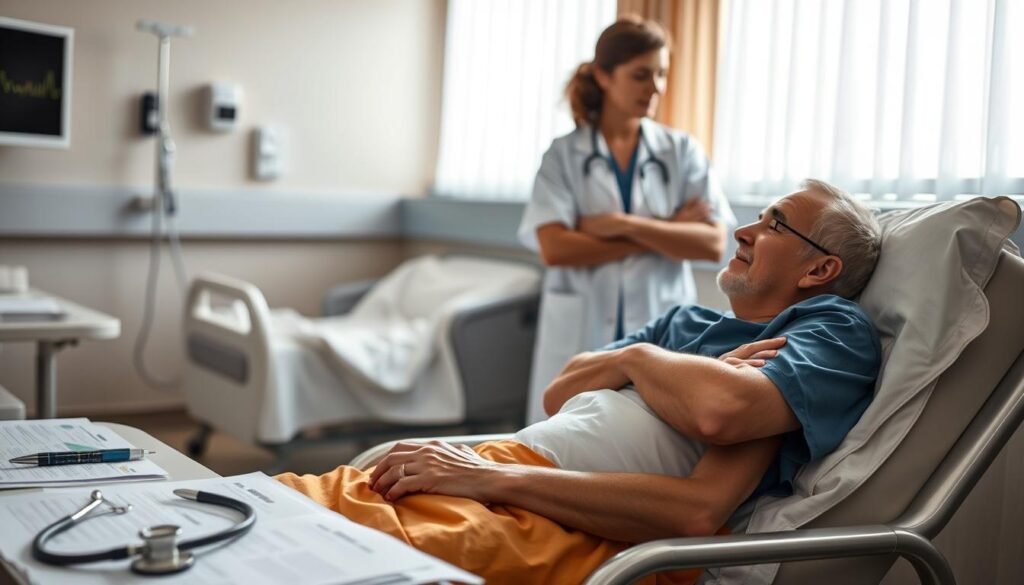Did you know that nearly 80% of cancer patients feel very tired during treatment? This shows how common it is for many to deal with cancer-related fatigue. This fatigue often continues even after treatment is over. It’s important for those going through cancer treatment to understand this issue.
Fatigue can come from many sources, like treatment side effects, the cancer itself, stress, and changes in how one lives. It can make everyday tasks really hard. That’s why finding ways to deal with managing fatigue during cancer treatment is key.
This article shares expert tips on handling fatigue. It looks at why fatigue happens, its signs, and what can help manage it. Using these tips can help improve life quality for cancer patients. They can feel more in control during their treatment. For more info on managing cancer-related fatigue, check out professional advice.
Key Takeaways
- Approximately 80% of cancer patients experience fatigue during treatment.
- Fatigue can stem from treatments, the cancer itself, emotions, and lifestyle changes.
- Managing fatigue effectively improves daily functioning and overall quality of life.
- Cognitive Behavioral Therapy (CBT) and physical activity can significantly alleviate fatigue.
- Complementary therapies, including yoga and mindfulness, may enhance patients’ resilience.
- Keeping a fatigue diary helps identify patterns and optimize daily energy management.
Understanding Cancer-Related Fatigue
Cancer-related fatigue (CRF) is the most common side effect of cancer and its treatments. This isn’t like the tiredness we all know. With CRF, no amount of rest seems enough. It can last months or even years after treatment is over.
The type of cancer and treatments like chemotherapy affect CRF. Health problems can also play a part. But, doing things like physical activity for a few hours every week helps a lot.
Drinking plenty of fluids is key, aiming for eight to ten cups a day. It’s also important to stay social but not overdo it. Eating small, balanced meals and snacks during the day is good for your energy.
Knowing all about CRF helps people manage it better. Learning and using things like relaxation techniques helps too. This way, people can get the support they need on their recovery path.
What Causes Cancer Fatigue?
Cancer fatigue is not simple, influenced by many factors. One main cause of Cancer Fatigue is the cancer itself. It releases toxins that change important body chemicals like potassium and calcium. Often, people with more advanced cancer feel more tired than those with early-stage cancer.
Treatments like chemotherapy and radiation play a big role in fatigue. Chemotherapy can cause anemia by lowering red blood cell levels. This makes you feel very tired and low on energy. Radiation can make you more tired during treatment. It can last weeks or months after.
Operations can also make you feel worn out. This tiredness can go on for weeks or months after the surgery.
Other treatments can lead to fatigue, too. Treatment Side Effects are important to consider. Hormone therapies might make you tired by affecting your hormone levels. They’re used for cancers like those in the breast or prostate. Other medicines like painkillers, antidepressants, and steroids can make you feel sleepy.
Your feelings play a big part in fatigue, too. Emotional Distress from anxiety or depression can drain your energy. Problems with sleep also add to feeling tired. And if you have heart issues or thyroid problems, it might make your fatigue worse.
Many things together cause cancer fatigue. Each patient feels it differently because of various reasons. Knowing these causes helps in finding the best way to deal with the tiredness that fits them.
Symptoms of Cancer Fatigue
Cancer-related fatigue dramatically reduces life quality. Patients often feel an intense tiredness that rest doesn’t fix. This deep tiredness can last for months or years after treatment ends. It’s especially hard for those with blood cancers.
Common indicators include:
- Physical Weakness: Having trouble climbing stairs or walking short distances may show muscle weakness and low energy.
- Emotional Exhaustion: May cause depression, irritability, and losing interest in activities once enjoyed.
- Cognitive Issues: Many report trouble focusing and remembering things due to ongoing fatigue.
- Sleep Disturbances: It’s common to have trouble sleeping well, which makes the tiredness worse.
- Physical Symptoms: Fatigue may also bring anemia, weight changes, dry skin, and hair loss.
It’s crucial for those feeling these symptoms to realize their importance. Talking to doctors about Symptoms of Cancer Fatigue helps get early help and support. Things like poor nutrition, anxiety, and depression can make symptoms worse. Proper assessment and tailored treatments can relieve these issues and help with everyday tasks.
| Symptom | Description |
|---|---|
| Physical Weakness | Difficulties with physical tasks, contributing to a sedentary lifestyle. |
| Emotional Exhaustion | Feelings of depression and irritability affecting social interactions. |
| Cognitive Issues | Lack of concentration and memory problems impacting daily activities. |
| Sleep Disturbances | Challenges in falling or staying asleep leading to fatigue. |
| Physical Symptoms | Manifestations like anemia and weight changes affecting overall health. |
How to Describe Your Fatigue to Healthcare Professionals
Effectively communicating fatigue is very important when talking to doctors. Up to 80% of cancer patients feel tired during chemo or radiation. It’s vital to describe when the tiredness started, how long it lasts, and how bad it is. Also, talk about how it affects your daily life.
A fatigue scale from 0 to 10 helps measure your tiredness. This method lets you share how you feel more clearly. It also helps doctors understand the level and type of your fatigue. Research shows fatigue can be mild to severe and might stay long after treatment ends. More than 30% of breast cancer patients still feel very tired up to four years after their diagnosis. Knowing this helps doctors plan better treatments.

Explaining your tiredness in detail helps medical teams understand cancer fatigue better. Different types of fatigue affect patients in various ways. For example, 35% feel physically tired, 25% emotionally drained, and 13% have trouble thinking. This information helps doctors make tailored treatment plans.
| Type of Fatigue | Percentage of Patients |
|---|---|
| Physical Fatigue | 35% |
| Emotional Fatigue | 25% |
| Cognitive Fatigue | 13% |
Improving how we explain fatigue can make doctor-patient relationships stronger. Working with therapists can create helpful exercise routines. These plans balance rest and activity, which is key for managing tiredness. To get more tips on dealing with cancer fatigue through exercise, check out this guide on exercise management.
Managing Fatigue During Cancer Treatment
Managing fatigue during cancer treatment requires a smart approach. This includes saving energy and planning rest. Patients often feel tired. This makes it important to choose activities wisely and keep energy up. Knowing how to handle fatigue improves life quality during these hard times.
Energy Conservation Strategies
Smart energy-saving methods can make dealing with tiredness easier. These methods include:
- Picking important tasks for times when you feel most alert.
- Splitting activities into easier steps.
- Using things like walking aids to save energy for big events.
- Asking for help with tasks to avoid getting too tired.
Taking short breaks all day can really help with energy. Studies show that up to 90% of cancer patients feel fatigued. So, these steps are key to staying well. For more tips, speak with health experts; talking to healthcare providers can offer advice that fits your needs.
Planning Rest Periods
Rest is vital in managing tiredness. Planning short naps under one hour can work well. Having a regular break schedule helps people recover and gain strength. It’s important to listen to your body, especially after tough treatments like chemo. Fatigue might peak after these treatments.
Keeping track of how tired you feel helps know when it’s worst. This helps when talking with doctors to tackle tiredness better.
Following your own energy-saving and rest plans can help you get through cancer treatment better. This makes your overall life quality better too.
The Role of Exercise in Combating Fatigue
Exercise helps manage cancer-related fatigue well. It boosts physical stamina and emotional well-being. Moderate aerobic exercise is best, as it benefits those suffering fatigue from cancer treatments.
Types of Exercise Recommended
Many exercises help with fatigue. Activities suggested include:
- Walking
- Swimming
- Cycling
- Strength training
A study with 56 reports showed aerobic exercise reduces fatigue. This is true for solid tumor cancers like breast and prostate. More studies are needed to find the best exercise details.
Consulting with Healthcare Providers
Talking to a doctor before exercising is crucial. It ensures safety and customizes the exercise plan. Since cancer patients often feel very tired, it’s important to make a plan that fits.
Exercising improves life beyond just health. Doing activities you enjoy makes you stick to your exercise plan better. This helps fight fatigue.
Overall, treatment should include good diet and less stress. For more tips, check out natural remedies for adrenal fatigue treatment.
Nutrition for Fatigue Management
Nutrition is key when managing fatigue during cancer treatment. A good diet helps keep energy up and improves health. Balanced Diet Importance shows how diet supports the body during treatment.
Importance of a Balanced Diet
A balanced diet is crucial for fighting cancer-related fatigue. Foods rich in lycopene, carotenoids, B vitamins, and omega-3s improve life quality. Proteins are also important. They maintain muscle and energy. Daily goals should include:
- One high vitamin C fruit
- One yellow or orange vegetable
- One serving of tomatoes
- One serving of leafy greens
- Three servings of whole grains
- Two servings of omega-3 fatty acid-rich foods
This eating plan helps cancer patients meet their nutritional needs. Nutrition counseling offers great advice on these dietary goals.
Hydration and Its Effects
Keeping hydrated is also a must during cancer treatment. Not drinking enough can make fatigue worse. Patients need to drink plenty of fluids. Water helps keep up energy and supports the body, especially when dealing with nausea and little appetite.
Sleep Hygiene and Its Impact
Sleep hygiene is key in battling fatigue for cancer patients. Tailoring sleep habits improves sleep quality, crucial for well-being. Good sleep hygiene fights sleep problems and boosts energy, being important in managing fatigue.
Establishing a Sleep Routine
For cancer patients, a steady sleep routine is vital. Regular sleep and wake times help improve sleep. Here are tips for a better sleep routine:
- Maintain consistent sleep and wake times, even on weekends.
- Create a restful sleep environment by minimizing noise and light exposure.
- Avoid stimulants, such as caffeine or nicotine, several hours before bedtime.
- Engage in calming activities, such as reading or gentle stretching, prior to sleep.
- Discuss any sleep disorders, such as insomnia or sleep apnea, with healthcare providers for targeted support.
Using these sleep hygiene tips creates a better sleep setting. It helps patients manage fatigue better, improving life quality during treatment.

| Practice | Benefit |
|---|---|
| Consistent Sleep Schedule | Regulates body clock, enhancing energy levels. |
| Calming Activities | Promotes relaxation, aiding in faster sleep onset. |
| Distraction-Free Environment | Facilitates uninterrupted sleep, improving overall sleep quality. |
| Limit Stimulants | Reduces sleep latency and aids in deeper sleep. |
| Consult Healthcare Providers | Addresses underlying sleep disorders, promoting better sleep health. |
Mind-Body Techniques
Using Mind-Body Techniques can really help reduce stress from cancer treatment. These methods help your body relax and improve your mood. Practices like yoga, tai chi, meditation, and deep breathing are great for relaxation. Many studies show these techniques help decrease stress and make life better.
Benefits of Relaxation Techniques
Relaxation Techniques improve overall well-being by lessening stress, which can make fatigue worse. This stress affects our bodies and increases the risk of health issues. Mind-Body Techniques can help lower this stress. They offer big benefits such as:
- Improved sleep quality, which helps over 72% of cancer patients with sleep problems.
- Less physical and mental symptoms, like pain which 59% of patients suffer from.
- Better emotional health management, crucial during cancer treatment.
- Help with pain, fatigue, and sleep issues that over 40% of cancer patients face.
Practicing Mindfulness or Meditation
Mindfulness like meditation makes a huge positive difference in a person’s mind. It lowers anxiety, reduces blood pressure, and helps you sleep better. Cancer patients can find many resources like books, websites, and recordings to learn mindfulness. Here are some easy ways:
- Deep-breathing exercises to help you relax and focus.
- Guided imagery to improve your thoughts and emotions.
- Meditation sessions made just for cancer patients.
| Mind-Body Technique | Relaxation Benefits | Recommended Frequency |
|---|---|---|
| Meditation | Reduces stress and anxiety | Daily, 10-20 minutes |
| Yoga | Improves flexibility and emotional health | 2-3 times per week |
| Tai Chi | Enhances balance and relaxation | Weekly classes or daily practice |
| Deep Breathing | Promotes immediate calmness | Multiple times a day as needed |
Adding Mind-Body Techniques to your daily routine can change how cancer patients deal with fatigue and stress. It can really make a difference during cancer treatment.
Complementary Therapies for Managing Fatigue
Many cancer patients turn to Complementary Therapies for fatigue relief. These therapies focus on improving mental and physical health.
Cognitive Behavioral Therapy (CBT)
Cognitive Behavioral Therapy helps identify and alter negative thoughts. It aids in developing coping strategies, improving mental states, and possibly reducing fatigue. Patients dealing with their emotional and psychological health often feel more in control of their fatigue.
Exploring Acupuncture and Massage
Acupuncture is a unique method for easing pain and fatigue. It involves fine needles at specific points to boost energy flow, leading to better relaxation and fewer side effects. Many find Acupuncture to be a crucial part of their care.
Massage therapy also helps by promoting relaxation, improving blood flow, and easing muscle tension. It offers comfort in tough times.

Talking to healthcare providers before starting these therapies is important. They ensure these methods are safe and right for each patient. For more tips on tackling cancer-related fatigue, check out this resource.
Conclusion
Managing cancer fatigue is very important. It helps improve life quality for patients in treatment. Cancer fatigue differs greatly among patients.
Lifestyle changes, exercise, and better diet can help a lot. These steps can make patients feel less tired and improve their health.
Regular exercise helps reduce fatigue both during and after treatment. It is a critical part of dealing with cancer fatigue.
Using psychological methods like cognitive-behavioral therapy helps too. Mindfulness techniques also play a role. These help patients handle their fatigue better.
It’s vital to talk with doctors and get support from family. This support can make overcoming fatigue easier.
In sum, combining these methods can lead to a better recovery journey. Having more energy makes daily activities easier for patients. As studies go on, it’s important for patients to speak up about their fatigue. They should look into different ways to manage it.